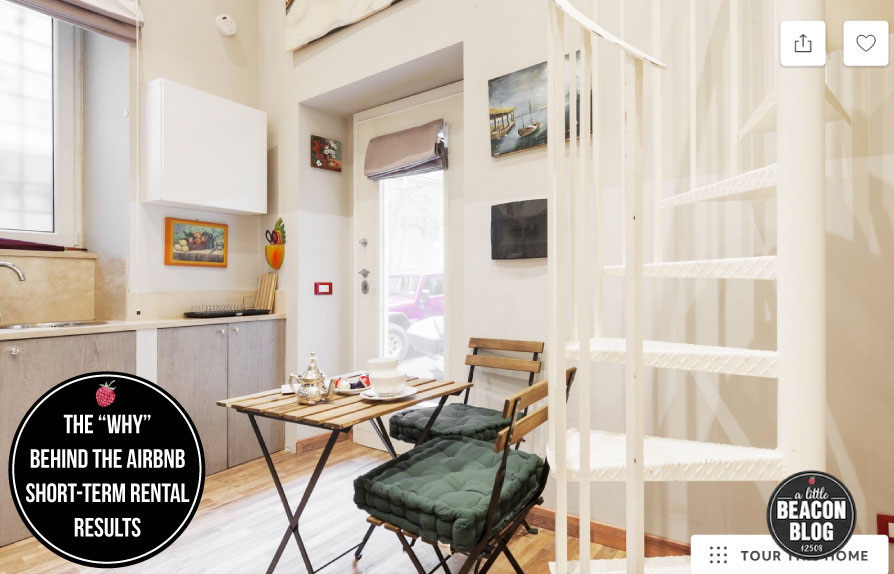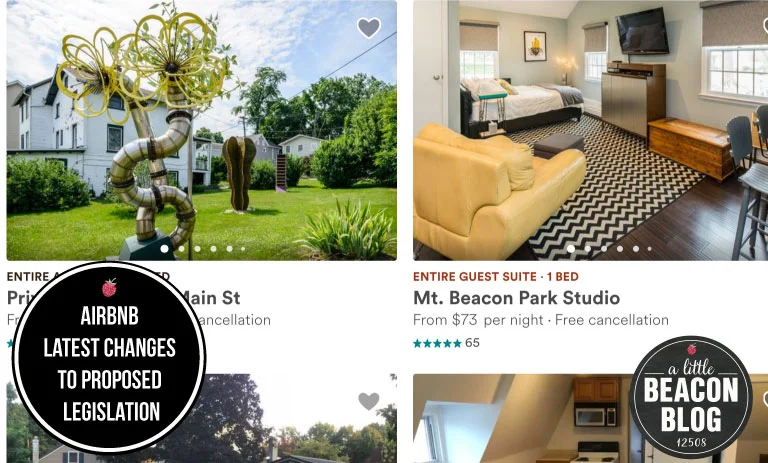Beacon has stepped up to the plate once again to consider creating legislation for short-term rentals in people's homes, also known as "home sharing," or "Airbnb-ing". Mayor Randy Casale has cited emails he has received from citizens who are opposed to short-term rentals in different capacities. Beacon considered legislating this in 2014 and created draft legislation in 2015, but never finalized it. Click here for a background of this Airbnb issue and why it is being discussed now.
In January and February of 2018, Beacon discussed short-term rentals at a City Council meeting, and held a Workshop discussion on the subject in February. In April, members of the public were invited to voice their opinion at a Public Hearing, at which over 20 people spoke favorably about their experience with short-term rental via Airbnb. They also expressed their reactions to the proposed restrictions in the proposed new law put together in 2018.
A handful of people showed up to speak out against short-term rentals, and voiced their desire for rules to be enforced - even though no local law exists yet in Beacon to be enforced. The law on the table right now is new. There are zoning laws at the New York state level, which include fire safety requirements such as installing sprinkler systems or breakaway windows. Those requirements can be a financial burden to homeowners, who also rent out their homes to earn extra income to keep up with their mortgage or rent payments.
Those in opposition of no regulation at all included a citizen, Elaine Ciaccio, who submitted a petition she started which had 70 signatures on it asking to "1. Ban non-owner occupied whole home short-term rentals and 2. Require registration and establish regulations that maintain the zoned character of our residential neighborhoods." Airbnb has submitted their written response to Beacon's legislation, which was to argue against many of the proposed restrictions. Neither the petition or Airbnb's testimony were read aloud at the Public Hearing, but around 30 people voiced their opinions, a majority of whom were homeowner/landlords of short-term rentals who were in favor of short-term rentals, and in favor of the least amount of regulation - if at all.
Legislation on the Table Now
LEGAL NOTE: Please know: this summation does not constitute as the draft legal document. You can find that legal document right here at this link. The information has been summarized so that you can see the points quickly. You should read the draft legislation yourself if this area of legislation concerns you. The people of a municipality do not have a lawyer representing them, as a city hires an attorney to represent itself. Council members may not necessarily be lawyers or specialized in a type of law being legislated. As a citizen, homework is involved.
Here is a summary of the law that the City Attorney has drafted as of April 4, 2018. Please see the actual draft of the law at the City of Beacon's website in their PDF here at this link. This draft is an edited version that the attorney made prior to the Public Hearing on April 2, 2018, and includes "track changes," which means that you can see what was originally proposed or how something was worded, and then was revised based on feedback.
Men's Rights
Before we begin, it is noted that women were not always included in the legislation wording. Women and men have since been written into the draft with both pronouns, "his or her." In prior draft laws, the male pronoun has been used, such as "his property." Being that married women used to not be able to own property at all in the United States prior to the 1830s, with different states coming on board with allowing women to own property through the 1840s '50s, and so on until the late 1800s (see Wikipedia for all the details).
In this latest April 4th draft, one possible loophole remains for women in this line item: "A short-term rental permit has been issued and the owner fails to continue to occupy the premises on a continuous basis as his primary residence; or..."
Additionally, the proposed legislation assumes that the Building Inspector, who is currently a man, will always be a man. The legislative wording reads as this: "The applicant shall be given an opportunity to present evidence why such denial of application, or such suspension or revocation of the license, shall be modified or withdrawn. The Building Inspector or his designated agent may also present evidence."
Who is an Owner?
According to the draft legislation, an owner would be defined as: "An individual or group of individuals who are in possession of and have a fee interest in real property. The term 'owner' shall not include entity corporation, limited-liability company, partnership, association, a trustee, receiver or guardian of an estate, or mortgagee, lien holder, or other business entity."
Owner Occupied would be defined as: "A one-family or two-family house or multiple dwelling building used by the owner as his or her or their domicile or principal residence."
The short-term rental space would be defined as: "An entire dwelling unit, or a room or group of rooms or other living or sleeping space, made available to rent, lease or otherwise assigned for a tenancy of less than 30 consecutive days. The term “short-term rental” does not include dormitories, hotel or motel rooms, bed and breakfast inns or lodging houses, as permitted and regulated by the City of Beacon Zoning Ordinance."
Permit would be required, would last for 2 years, and would be able to be renewed.
The application of the permit would be submitted to the Building Department. Several pieces of information would be required, including a notarized certificate from all property owners.
A broad requirement of the City requiring anything: The proposed law also has a line that broadly gives the City the ability to require information not defined in the legislation, with this wording: “Such other information as the City may require.” When two parties are negotiating a contract, statements like this are inserted by a party who wants to cover a large ground of protection. It can be argued that it is up to the other party to accept that or negotiate that statement out of the document.
Permits may be revoked if specified conditions occur, such as an owner not occupying the premises as the owner’s primary residence, or if the property “creates a hazard or public nuisance or other condition which negatively impacts the use and/or enjoyment of surrounding properties, or threatens the peace and good order, or quality of life in the surrounding community.”
Violation fines could be up to $500 per offense. “Any owner who fails to obtain the permit required herein, or otherwise violates any provision of this section, shall be guilty of an offense which shall be punishable by a fine of not more than $500 per offense.”
Attics and cellars would not be allowed to be rented “unless it meets the requirements of the International Fire, Residential and Building Codes or successor law.”
Short-term rentals could be in any zone of the city, and would not be dependent upon the zoning type your house or apartment was in.
Advertised locations: The owner would have to show where they are advertising the listing.
Proof of rental bookings required. The number of days rented would have to be printed out from home-sharing listing websites and shown to the Building Inspector when the property owner(s) want to renew the permit.
Inspection by the Building Department would be required at the time of initial application, and any permit renewal.
Primary residences only are eligible. Owners of short-term rental properties would only be able to rent out that property that they call their primary residence. If it is not their primary residence, they cannot rent out. If they have a second home or house or apartment in Beacon, an owner could not rent it out as a short-term rental.
Campers, sheds, vehicles parked on property, tents, recreation rooms, garages, temporary structures, or other things could not be rented out from the homeowner's property.
Wedding, concerts or other commercial situations would not be able to be rented.
100-day rental limitation has been scratched out. In last month’s draft, there was a proposed limit of 100 days rented per calendar year. Comments from the public indicated this would impact their income, and in some cases, prevent them from making their own mortgage or property tax payments. In the proposed law, there is a strikethrough line through the verbiage, indicating that it is off the table as a restriction.
Timing to get permits: If approved, “This local law shall take effect immediately upon filing with the Office of the Secretary of State. Any short-term rental in existence prior to adoption of this local law shall have 45 days to file an application to obtain a short-term rental permit and 90 days to receive such short-term rental permit before any violations are issued, unless a delay is caused by Building Department in not issuing said permit.”
General Tone of the Legislation is Assumptive of Rowdiness - But Airbnb-ers Have Attracted Quiet Renters
In this proposed law language, the City's position takes an approach that defends the citizens, and one that assumes that renters are likely to be disruptive. Setting the stage for the legislation, the following is written into the introduction of the proposed law: "There is a greater tendency for Short-Term renters to fail to conduct themselves during their occupancy in a manner that respects neighbors and the community as would persons with longer standing relationships to their neighbors. In addition, studies have shown that short-term rentals are linked to increases in rent and housing costs because rental units are taken off the market and used as short-term rentals."
Studies, or supporting documentation, mentioned in this statement have not yet been provided or presented to the public for the creation of this law.
During the Public Hearing, all of the people in favor of short-term rentals credited Airbnb itself with creating a good-neighbor environment thanks to Airbnb's background checking and self-governing rules that publicly grade short-term rentals, as well as factor in private feedback. Said a citizen and homeowner landlord, Dennis Mendo, "From renting out an Airbnb for the last 3 years, I have not had one complaint. Not one thing broken. And I live in a cul-de-sac."
During the Public Hearing, it was revealed that people who are renters through Airbhb have to:
- Pass background checks from Airbnb.
- Can be denied a booking by homeowner short-term rental landlords.
Jessica, a woman who spoke at the public hearing and has a legal long-term rental on the property, also rents a part of the home as a short-term rental. She commented about the neighbor safety in place created by Airbnb's rental marketplace, stating: "I know more about my Airbnb guests than I do about my own tenant."
She went on to explain: "Guests have to go through a three-step verification process that the hosts sets the limits for, that ensures that [the guests] are who they say they are… If anything isn’t fit or isn’t how it was described or is unsafe in any way, shape, or form, they let other potential guests know by giving a lower number of stars and/or giving public feedback or private feedback."
Another attendee of the Public Hearing, Eva, rents her family's home on a short-term basis, and had this to say about her selection process about who books: "We do not accept every booking. We only accept [guests] who are willing to follow our rules. And this is why we only have 10 guests so far since 2017."
The next discussion of short-term rentals is on Monday, April 9, 2018. This will be a Workshop, where the City Council discusses the points it is considering. The workshop is open to the public to watch, but not to participate in. The next opportunity for the public to comment would be during the Miscellaneous Comment period of City Council meetings in general, which usually happen the following Monday.
For those who like auto-updates via RSS, A Little Beacon Blog has been re-publishing Agendas and Videos in our "Easy Access" City Government section of this website. There, you can easily find videos posted with each meeting, and links to the accompanying Agenda items, which can include useful information like drafts of laws, letters of testimony, maps, and more.
Please see the actual proposed draft legislation for this law on the city's website. You can find it here at this link. It is called "LL Short Term Rental with changes."
RELATED ARTICLES


















































